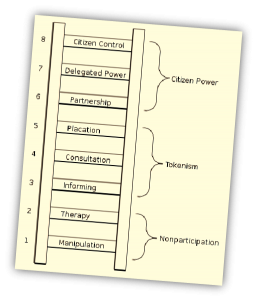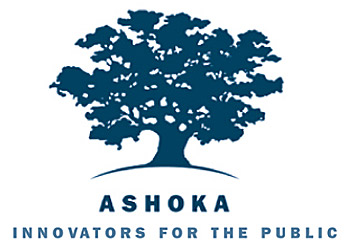Only articles in with the "Citizen" tag are displayed
To display all articles click
here.
 |
14. November 2011 – 23:06 by Asociacion Ciudades Kyosei / Pedro Prieto-Martin
|
The Asociación Ciudades Kyosei is a small civic organization whose aim is to foster Civic Engagement by means of ICT. It was founded in 2006 and is the oldest Spanish NGO devoted to the promotion of (e)Participation. In the last years we were researching on the field of Civic Engagement and ICT, with a special focus on Latin-America and Europe. Our work combines a critical attitude with an applied, hands-on focus, and has (1) theorized about Civic Engagement, (2) analysed the best design practices for (e)Participation systems, as well as (3) analysed the difficulties that exist to promote innovation in the ICT for Governance field. Our research has been widely recognized as refreshing and insightful.
In this PeP-NET post we would like to share a tool we have developed, “The matrix of civic implication”, whose main aim is to support the development of conceptual clarity when analyzing participatory venues and participatory initiatives. If used wisely, we think the matrix is a powerful “tool”, that goes beyond alternative models (like OECD, IAP2 or Fung’s), and should allow researchers, practitioners and the ‘man in the street’ to better understand the core dimensions of participatory activities.
The Matrix of Civic Implication
 Since Sherry Arnstein presented her “Ladder of Citizen Participation” in 1969, tens of models have been proposed with the aim to describe “participation”.
Since Sherry Arnstein presented her “Ladder of Citizen Participation” in 1969, tens of models have been proposed with the aim to describe “participation”.
The problem with these models is that they tend to be either too basic -and thus they add less value- or they are too complex and specialized, and in this case they are too cumbersome to be applied.
For this reason… a lot of confusion exist in this field.
Our matrix tries to find a pragmatic balance between usefulness and complexity, and provide a tool that is at the same time powerful, practical and easy to use. It allows practitioners and theorists to compare in a matter of minutes different Participatory experiences. The model was developed to be applied to “municipal participation” initiatives, but it can be applied to other kind of participatory experiences.
The Matrix identifies four fundamental dimensions of participatory initiatives, which be informally “visualized”, and thus make this model especially suitable for comparing initiatives:
Read the rest of this entry »
Posted in open data, Tools, Visions | 1 Comment »
 |
26. August 2011 – 14:38 by Asociacion Ciudades Kyosei / Pedro Prieto-Martin
|
 Ashoka Foundation, with the support of Google, has launched Citizen Media: A Global Innovation Competition. Well, it was launched more than one month ago, but you still have 19 days (till Sep 14th) to present a proposal.
Ashoka Foundation, with the support of Google, has launched Citizen Media: A Global Innovation Competition. Well, it was launched more than one month ago, but you still have 19 days (till Sep 14th) to present a proposal.
This competition is very related to the e-Participation field, as Ashoka considers it as linked with the fields of “Citizen participation” and “Journalism”.
Ashoka and Google are seeking innovations that will allow global citizens to have a voice and the information they need to make change. The competition welcomes solutions that work with any communication or information technologies—not just the Internet. The contest is open to solutions around the world: you ara allowed to present you entry in English, Spanish, Portuguese, French, Arabic, Thai, Indonesian, Mandarin or Japanese.
Some of the benefits mentioned for participants are:
- Connect to a global online community that supports the impact you are making, or seeking to make, on the ground.
- Gain visibility with our community and our competition partner, Google.
- Position yourself as a candidate for an Ashoka Fellowship within our News & Knowledge program.
 The prizes of the competition are:
The prizes of the competition are:
- One of four US $5,000 cash prizes in unrestricted funding to boost your project.
- Consideration for an Ashoka Fellowship—complete with a three-year living stipend, international recognition, and access to a network of systems-changing social entrepreneurs.
Have a look at the webpage of Ashoka Changemakers for more details.
PS: By the way, there is an entry for our Kyopol System. We would be more that pleased if you’d like to give us any feedback about our proposal.
Posted in calls & tender, ICT, inclusion | 1 Comment »
 |
20. April 2010 – 15:06 by Madarász Csaba
|
The European Citizens Intiatiave is on the right track after the Lisbon Treaty to open new gates to the European Commission.

European Citizens Initiative
1 million signature – not so much, if we think about the population of Europe.
The ECI is giving a sharp outlook on their website about the passed public consultation and Commission’s points.
If you have not heard about the ECI -documents below helps to formulate opinion and getting know the project better visit their website https://www.citizens-initiative.eu/ or start browsing the core documents here:
Posted in inclusion, News, Projects | No Comments »
 |
24. November 2009 – 11:48 by Civil College
|
Most of us has at least some opinion around the Ministerial Declaration, which has been adopted before the high level e-government conference of the Swedish presidency: Teaming Up for the EUnion
There is some doubt, wheter this declaration is making change or not. As analyst Andrea Di Maio writes about it :
“If government 2.0 is about discontinuity, enabling bi-directional flows and engaging new stakeholders, the EU declaration has failed on every account.”
Personally – the Hungarian Government’s Electronic Center for Public Administration has not even translated the full text, only published an excerpt , without mentioning Open, Accessible, or Transparency, some criterias of good governance, mentioned in the declaration.
Moving beyond
In my previous article, I have been writing about the participatory based, citizen centric event, which ran paralell to the 5th conference. Surprisingly, some of the guests of this unconference has been also participated in the “main” and the research focus “pre”conference, making the cultural flow rich between researchers, practicioners and businesses.
The openness of this conference has let Mats Odell, the minister for financial markets and local governance to hold a pecha-kucha styled presentation about the declaration – which has gained far more acceptance in this form, than in the official one, although
About 25-30 people – he has come to visit us there. It might be the elections, it might be Magnus Kolsjö‘s advice, or some personal drive, or even the way, how Sweden is showing approach to open government. Who knows? But the Minister has missed something, by not staying with us, only for half an hour..
The Pretinent Art award – which has been launced before the unconference – winner has become a project of the Open Rights Group: Statebook.

Runners up included the Woberator from Holland, which breaks Ministries’ resistance to FoI requests by spamming them, and Evasori.info, the Italian mashup which maps tax evaders.
Sir Bonar has addressed unconference participants in a video message, which helped to focus on various aspects of diplomacy: see video here- https://www.youtube.com/watch?v=fVEwajqxtnk&feature=player_embedded
Beside the fact,that the unconference has been an event, run by citizens with the kind support of the local community place, Garaget, has showed some possible new trend of citizens. It was not yet about the first European Hackathon, or eDemocracy Camp, nor about the HackEu event series. But I am quite sure, that this is the direction, where Europe has to follow it’s forerunner examples, Australia, USA and the UK.
In my presentation held at the preconference, I was trying to show not only some good examples of citizen drived development collaboration (with the state) but to highlight the socio-technological innovation behind it.
Photos of the unconference can be accessed here: https://www.flickr.com/photos/tonz/sets/72157622843812538/
by the way, the well knowwn P2P foundation’s head, Michael Bauwens has made a great presentation on “Open Everything” in for the TEDx Brussels event at the European Parliament:
https://prezi.com/tlsiltvngctq/
Posted in Events | No Comments »
 |
13. November 2009 – 10:01 by Civil College
|
I think, most of us can feel the hot air breezing us during thes days. I have just hit the engaging film from ConnectedRepublic supporting EUPS20, the declaration, which if you did not sign, it is high time, just now. I think all of us wishes it’s sucess, but have you tweeted about it today? Or called your facebook friends attention to it?
Above all scepticism of social media enthusiasm, there is really many things going on. Have you heard about, that OpenID biggest government boost is happening – according to Dana Blankenhorn, by the U.S. government endorsment of OpenID.
However, Malmö is a great city, with a lot of openness. The Garaget, a historical place for civil movements and an innovative social solution of the City, is offering the really warm role of being the host of this event: First Popular European Egovernment Conference, which is taking place in Malmö, paralell to the 5th Ministerial Conference on Egovernment – more in a Pecha Kucha / Unconference style, offering open spaces for discussion and agenda setting.
These events forerunner is the eGovernment Research and Innovation Conference , happening just right before these events.
Watching US NOW is good warmup. Do check it out, if you have not seen it.
It is obvious now I hope for everybody reading this blog, that the really intersting things are happening on two fronts. Most of us understands, that the open(source) community workers by hacking codes and fixing bugs are good citizens. Or more than good – they also share freely what they have back to the community. And those, who are going there and opening a space for discussion on the topic, they are partners for creating better governance. For now, the Swedish Minister, Mats Odell has confirmed his presence, according to the website of the Ministerial Conference thruogh Magnus Kolsjo‘s tweet.
I wish, that the social and scientifical openness will meet with good cultre. Just as the Minister for Local Governments and Financial Market says on his site:
“I want to ditch the unwritten law that keeps us from standing out from the crowd and make way for the Ingvar Kamprads of tomorrow and other dynamic people – for a society that will harness your creativity and your potential, so as to benefit you and other people.”
Check out the conference twitter page here: https://twitter.dijksman.com/
and look for the hashtags #malmo09 and #egov2009
Posted in Events, inclusion, News, Projects, Trends, Visions | No Comments »
 |
27. October 2009 – 09:54 by Madarász Csaba
|
I am always loving the opportunity, to give news of good, impressive, useful services, tools, that are coming from the citizens and their groups, empowered by technology and courage.
Most of us have heard about the Tenders Electronic Daily service of the European Union, which is a compelx service dedicated to European public procurement.
The TedBot is an innovative approach, to visualize the tenders and their results on a google map. In this form, it is a great example of how to use knowledge and personal interest to create an advanced service.
Hopefully, it will catch the eye of the European Comission, and will extend the TED with TedBot, showing a some megabites of wise leadership towards citizen initiatives.
But let’s do listen to the creator:
the TedBot
Posted in good practice, Projects, Tools | No Comments »
 |
25. June 2009 – 15:03 by E-Voting.CC
|
Earlier I have written about the Student Union elections of May 2009 which were Austria’s first use of a legally binding electronic voting system.
The E-Voting system required the students to authenticate themselves using a citizen card. In Austria this “citizen card function” is included in the social security card, which is called e-card. The e-card was launched in March 2005 in order to modernize the old fashioned system of legitimizing the citizen’s status in front of doctors via the paper version of the “Krankenschein”.
The e-card has since then been issued 8.5 million times according to the official website. 11.151 partners accept the e-card in doctor’s practices all over Austria and it has been used 405 million times for this purpose. But the e-card is much more than a tool for more efficient social security administration. Read the rest of this entry »
Posted in good practice, News, Projects, Trends | No Comments »
 |
26. March 2009 – 10:55 by Civil College
|
A success story of offline media
At least 525,000 verified signatures have been collected, far more than the mandatory 200,000, in support of a referendum on MPs’ expenses. 
The idea behind the initiative is that MPs be compelled to provide invoices for any expenses claimed – which is not yet a case in Hungary. After the time cosuming signature collection, driven and organized by a Mother of 4.
The person who initiated the referendum drive, Mária Seres, told reporters later in the day that this is the first time that an individual managed to collect so many signatures for a referendum, althoug, the road was really bumpy. Her website has been hacked several times, and rumours has been taking place about her political relations.
But what was the biggest support for the case, is the role of a Hungarian daily tabloid newspaper, Blikk, which has give a whole page for the initiative and offered a signature sheet to be cut out.
This action raised with more than 300,000 thousand signatures on one weekend!
I am fairly sure, that both offline and online media has a different role to play when citizen initiatives like Maria Seres’s are taking place – this success story of media responsibility for important social cases could drive more and more players of the media filed to show and practice more direct support.
Posted in good practice | No Comments »
 Since Sherry Arnstein presented her “Ladder of Citizen Participation” in 1969, tens of models have been proposed with the aim to describe “participation”.
Since Sherry Arnstein presented her “Ladder of Citizen Participation” in 1969, tens of models have been proposed with the aim to describe “participation”.




![Reblog this post [with Zemanta]](https://img.zemanta.com/reblog_e.png?x-id=82c06808-068b-45eb-b0f7-31fbc58f0b91)







